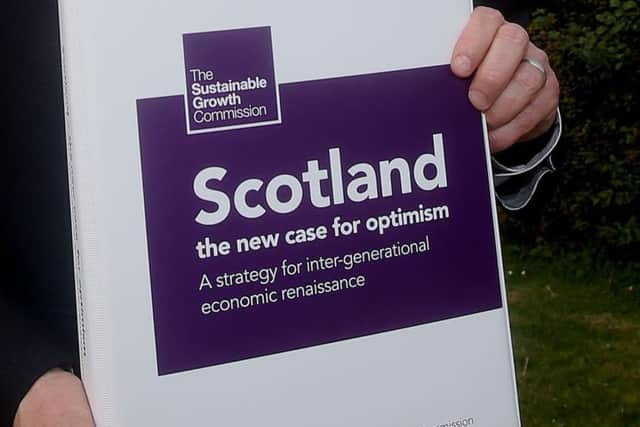Does the Growth Commission boost the case for Scottish independence?
Currency, jobs, taxes. The Better Together campaign, often dismissed as overly negative, knew Scots were likely to pay attention anytime it raised those three subjects. The Yes campaign offered reassurances but too often found itself on the back foot.
The Growth Commission report is trying a different strategy. It admits there will be consequences of independence while retaining some of the optimism that characterised the Scotland’s Future white paper.
Advertisement
Hide AdAdvertisement
Hide AdIt accepts Scottish banks would be unlikely to remain headquartered north of the Border but counters the long-term benefits of an independent Scotland would more than make up for such a loss, with many executive functions at RBS and elsewhere already carried out in London.


The report also suggests using sterling for an undefined transition period post-independence. The major downside is the Scottish Government would have no say on monetary decisions, such as interest rates, made by the Bank of England.
Pro-Union parties made political hay with that policy in 2014 and will attempt to do so again. Already Scottish Twitter feeds are filled with debates on so-called “Sterlingisation”.
The report’s authors say the door would be left open for an indy Scotland to launch its own currency - if six stringent tests could be passed. That will please long-term advocates of a separate currency, such as the Greens.
Some SNP supporters have wondered why a report that offers some frank admissions - such as accepting the GERS analysis of the Scottish economy - needs to be published now, given there is no date for any IndyRef2.
Others realise there is a need to sharpen pro-independence arguments blunted by time. Four years on and the political and economic landscape has changed. The UK is heading out of the European Union and the North Sea energy sector has endured a brutal downturn. While oil prices are now recovering, with exploration and production in the UK sector steadily rising, the Growth Commission wants Scots to view oil as a bonus rather than the backbone of the economy.
To Scottish Conservatives, much of this may feel like old hat. They believe the economy - whether it be banks or currency - remain their strongest cards to play in the high-stakes game over the future of the Union. They’ll gamble this new report will do little to change those odds.
Some on the left are unimpressed. Several Labour members have criticised the apparent lack of trade union involvement in the report. The business-friendly jargon used throughout has also been criticised.
Advertisement
Hide AdAdvertisement
Hide AdOne left-leaning academic, Rory Scothorne, observed: “‘The tools in the toolbox’, a bespoke ‘package’, a programme to ‘deliver economic growth’ - the most dangerous thing about the Growth Commission is its effort to restart a debate on deep political change which is entirely confined within the ideology of corporate management.”
The worst case scenario for the report’s authors is that their work is simply ignored, rather than keenly debated. The spectre of Brexit, and its never-ending list of unknowns, is never far away.
The arguments for independence have changed. But will those who voted No in 2014 be prepared to listen?
